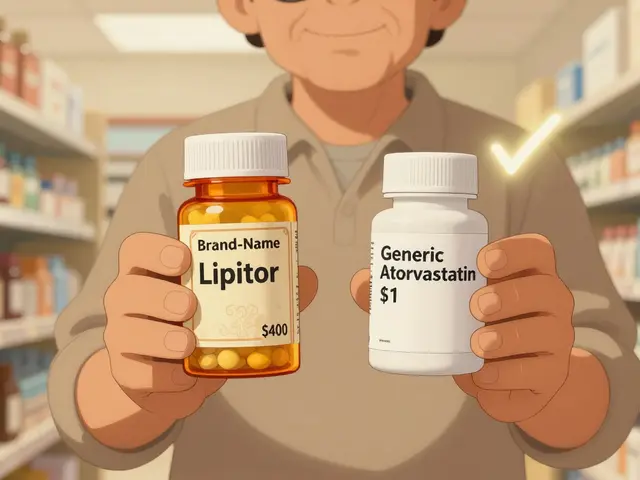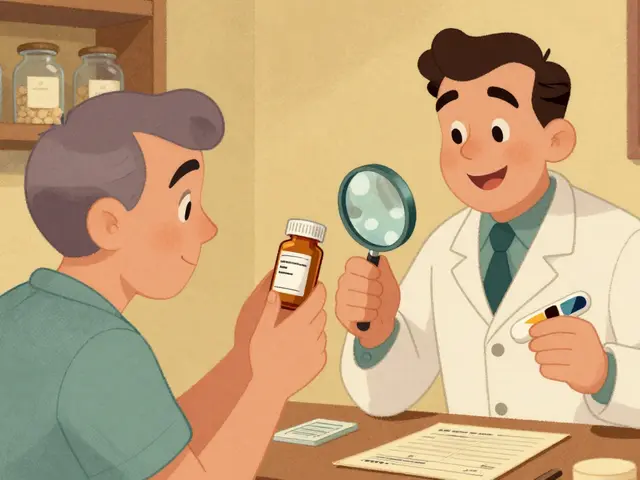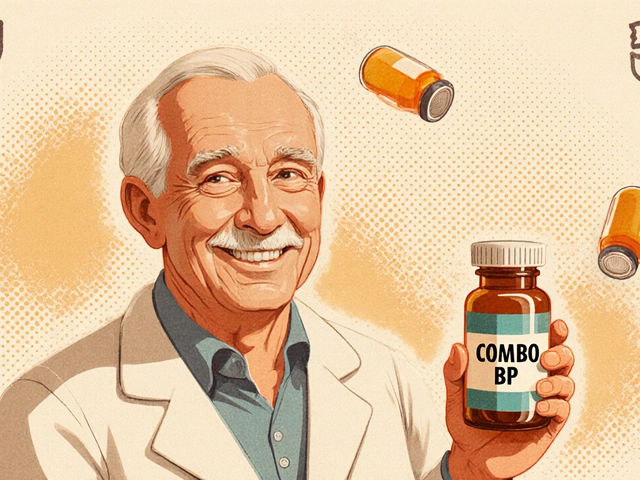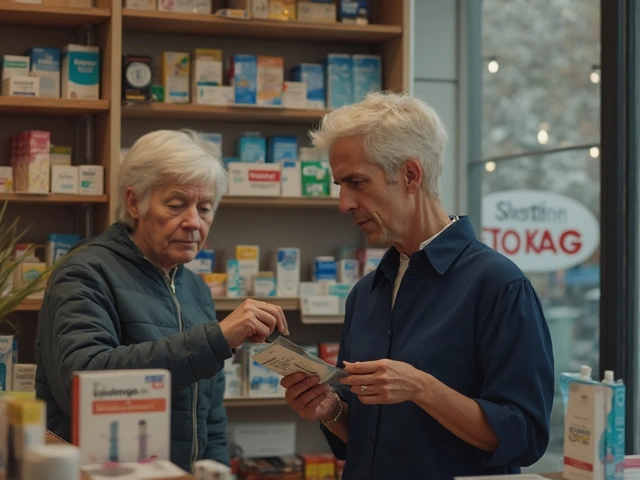Bicalutamide and Sexual Function: Managing Side Effects
Understanding Bicalutamide and its Effects on Sexual Function
Bicalutamide is a medication commonly prescribed for men with advanced prostate cancer. Its primary function is to block the effects of testosterone, a hormone that can fuel the growth of prostate cancer cells. While this treatment can be effective in slowing down the progression of the disease, it can also have a significant impact on a man's sexual function, including libido and erectile function. In this section, we will explore the reasons behind these side effects and discuss ways to manage them.
How Bicalutamide Affects Testosterone Levels
Testosterone is a hormone that plays a crucial role in maintaining a man's sexual function. Bicalutamide works by binding to androgen receptors in the body, blocking testosterone from binding to these receptors. This effectively reduces the levels of testosterone in the body, which can result in a decrease in sexual desire and the ability to achieve and maintain an erection. It's important to understand that these side effects are a direct result of the medication's action on testosterone levels and are not indicative of any underlying issue with your overall health.
Managing Decreased Libido
Dealing with a decreased libido can be challenging, both physically and emotionally. The first step in managing this side effect is to communicate openly with your partner about your feelings and concerns. It's essential to remember that your relationship is not solely based on sexual intimacy. Engaging in non-sexual activities that promote closeness and emotional connection can help maintain the bond between you and your partner.
Additionally, consider discussing your concerns with your healthcare provider. They may be able to recommend alternative treatments or adjust your Bicalutamide dosage to minimize the impact on your libido. In some cases, supplemental testosterone therapy may be an option to help counteract the effects of Bicalutamide on your sexual desire.
Addressing Erectile Dysfunction
Erectile dysfunction (ED) is a common side effect of Bicalutamide, but it doesn't have to be a permanent issue. There are several treatment options available to help manage ED, including oral medications like sildenafil (Viagra) or tadalafil (Cialis). However, it's essential to consult with your healthcare provider before starting any new medication, as there may be potential interactions with your current treatment plan.
Other non-pharmacological options to consider include vacuum erection devices, penile injections, or penile implants. These methods can help restore erectile function and improve overall sexual satisfaction. Your healthcare provider can guide you in choosing the best option for your specific situation.
Dealing with Changes in Ejaculation and Fertility
Some men on Bicalutamide may experience a decrease in the volume of ejaculate or even complete absence of ejaculation. This can be a result of the medication's effect on the prostate gland and seminal vesicles. While this change may be distressing, it's essential to know that it doesn't necessarily affect your ability to achieve orgasm or experience sexual pleasure.
However, it's important to note that Bicalutamide can have a significant impact on fertility. If you're concerned about your ability to father a child, discuss this with your healthcare provider. They may recommend alternative treatments, or suggest sperm banking or other fertility preservation options before starting Bicalutamide therapy.
Exploring Alternative Treatments
If the sexual side effects of Bicalutamide are severely impacting your quality of life, it may be worth discussing alternative treatments with your healthcare provider. There are other medications and treatment options available for prostate cancer, and your provider can help you weigh the pros and cons of each approach to determine the best course of action for your specific situation.
Support and Counseling
Dealing with the sexual side effects of Bicalutamide can be emotionally challenging. It's important to seek support from friends, family, or support groups to help cope with these changes. Additionally, professional counseling or therapy, either individually or as a couple, can be beneficial in addressing the emotional impact of these side effects and helping you develop strategies to maintain a healthy and satisfying relationship.
Conclusion
While Bicalutamide can be an effective treatment for advanced prostate cancer, it's essential to be aware of the potential impact on sexual function. By understanding these side effects and exploring options for managing them, you can maintain a fulfilling and satisfying sex life throughout your treatment journey. Remember, it's crucial to communicate openly with your partner and healthcare provider about your concerns and seek support from friends, family, or professionals when needed.







18 Comments
melissa hird
April 27, 2023 at 21:54
Ah, the marvels of modern oncology-so eloquently described, one can almost feel the zest for life emanating from the page. It is, of course, utterly delightful that a pharmaceutical agent designed to mute testosterone should also mute the very notion of virility, as if the body were a piano and bicalutamide the dampening pedal. One might applaud the seamless integration of clinical efficacy and existential dread. Yet, perhaps a dash of optimism would suffice, lest we drown in the melodrama of diminished libido. In any case, the recommendation to discuss dosage adjustments with a physician appears as groundbreaking as the invention of the wheel.
Mark Conner
May 4, 2023 at 04:48
Man, this drug sounds like it’s trying to sabotage any chance of a good night.
Charu Gupta
May 10, 2023 at 11:41
Indeed, the hormonal imbalance caused by bicalutamide can be quite distressing 😊. However, it’s crucial to remember that medical management often involves a multi‑pronged approach, including lifestyle modifications and possibly adjunct therapies. Consulting with an endocrinologist may help tailor a regimen that mitigates side‑effects while preserving oncologic control. 🍀
Abraham Gayah
May 16, 2023 at 18:35
Wow, talk about drama! First you get a cancer diagnosis, then the meds take away your mojo-what’s next, a Netflix series about the tragic love life of a hormone? Honestly, the whole thing reads like a soap opera scripted by a pharmaceutical PR team. If you’re looking for a plot twist, maybe consider a penile implant; at least that adds some excitement.
rajendra kanoujiya
May 23, 2023 at 01:29
Everyone seems to accept these side effects as inevitable, but one could argue that the dosage could be fine‑tuned to spare sexual function without compromising cancer control. The literature does contain studies where lower doses achieved comparable PSA reductions. So, perhaps the standard protocol is overstated.
Caley Ross
May 29, 2023 at 08:23
While the article is thorough, it might help readers to know that lifestyle factors-like regular exercise and a balanced diet-can sometimes offset hormonal side effects. Small changes, such as strength training, have been shown to boost endogenous testosterone modestly.
Bobby Hartono
June 4, 2023 at 15:16
Reading through the overview of bicalutamide’s impact on sexual health reminded me of the countless conversations I’ve had with patients navigating the delicate balance between life‑saving treatment and quality of life. First, it’s essential to acknowledge the emotional weight that comes with a diagnosis of advanced prostate cancer, a weight that is already heavy without the added burden of reduced libido or erectile dysfunction. Many men feel as though a core part of their identity has been taken away, and this perception can ripple through intimate relationships, sometimes causing strain that extends beyond the bedroom. Communication, as the article rightly points out, becomes the cornerstone of coping; partners who engage in open, non‑judgmental dialogue often find new pathways to intimacy that do not rely solely on sexual performance. Second, the role of a multidisciplinary care team cannot be overstated. An oncologist, urologist, endocrinologist, and mental health professional working in concert can craft a plan that addresses both the oncologic and psychosocial dimensions of treatment. For instance, involving a sexual health therapist early on can provide couples with strategies such as sensate focus exercises, which shift the emphasis from penetration to pleasure, thereby reducing performance anxiety. Third, the pharmacologic options mentioned-such as PDE5 inhibitors-are not a one‑size‑fits‑all solution. Their efficacy can be blunted by the very anti‑androgenic action of bicalutamide, and some men may experience contraindications due to concomitant cardiovascular conditions. In these scenarios, mechanical aids like vacuum erection devices or even low‑dose testosterone supplementation under strict medical supervision might be viable alternatives. Moreover, the discussion about fertility preservation is crucial. Sperm banking before initiating therapy offers a tangible hope for future family planning, and many clinics now integrate on‑site cryopreservation services to streamline the process. Lastly, psychosocial support groups-both in‑person and online-provide a community where men can share experiences, coping strategies, and encouragement. Hearing stories of others who have successfully navigated sexual side effects can be profoundly reassuring. In sum, while bicalutamide presents undeniable challenges to sexual function, a comprehensive, patient‑centered approach that combines medical, behavioral, and emotional interventions can preserve intimacy and dignity throughout the treatment journey.
George Frengos
June 10, 2023 at 22:10
It’s encouraging to see that there are multiple avenues to address these side effects, from medication adjustments to counseling. Patients should feel empowered to bring up concerns early, as proactive management often leads to better outcomes.
Jonathan S
June 17, 2023 at 05:04
One cannot help but notice the moral undertones in the original piece, which seem to gloss over the profound ethical dilemma faced by patients: the trade‑off between extending life and preserving personal dignity. While the clinical data support the efficacy of anti‑androgen therapy, the psychological toll-manifested in feelings of inadequacy, loss of masculinity, and strained relationships-demands equal attention. 📚 It is incumbent upon healthcare providers to adopt a holistic perspective, integrating mental health support as a standard component of the treatment protocol. Moreover, the conversation around fertility should not be relegated to a footnote; it warrants a dedicated discussion that respects the patient’s future aspirations. 🤔 In short, the path forward lies in a balanced approach that honors both the science and the humanity of those we serve.
Charles Markley
June 23, 2023 at 11:58
The pharmacodynamics of bicalutamide are well‑characterized, yet the discourse seldom addresses the nuanced interplay between androgen receptor blockade and downstream signaling pathways that influence vascular erectile mechanisms. A deep dive into the molecular cascade would elucidate why PDE5 inhibitors exhibit variable efficacy in this cohort.
L Taylor
June 29, 2023 at 18:51
so basically you got a med that blocks testosterone which then can mess with sex you should talk to your doc about other options its not the end of the world
Matt Thomas
July 6, 2023 at 01:45
look its clear the doc wrote the script but didnt think about the side effects its like they forgot u still got a life outside the hospital
Nancy Chen
July 12, 2023 at 08:39
Ever wonder why the pharma companies push these anti‑androgens so aggressively? Some say the real agenda is to keep the market saturated, ensuring continuous profit streams while patients silently surrender their sexual vitality. The veil of “clinical necessity” often masks a deeper, more insidious strategy.
Jon Shematek
July 18, 2023 at 15:33
Stay positive, folks-there are plenty of tools out there to keep the spark alive. From counseling to meds, you’ve got options, so don’t lose hope.
Beverly Pace
July 24, 2023 at 22:26
It is disconcerting that sexual dysfunction is frequently presented as an unavoidable side effect rather than a modifiable condition that deserves proactive management.
RALPH O'NEIL
July 31, 2023 at 05:20
I’m curious about the prevalence data-how many patients actually report significant libido decline versus mild changes? Understanding the distribution could help tailor counseling strategies.
Mark Wellman
August 6, 2023 at 12:14
Honestly, the whole conversation feels like a never‑ending saga where each new medication just adds another chapter of compromises. Patients end up juggling chemo, hormone blockers, and a laundry list of side effects, all while trying to maintain a semblance of normalcy. It’s exhausting, and the system rarely offers a clear roadmap. Sometimes I wonder if the cure isn’t worth the cost. The endless appointments, the constant monitoring, the invasive tests-it all adds up to a marathon with no finish line in sight. And then there’s the emotional fallout: anxiety, depression, strained relationships, and the feeling that your body has become a battleground. We need more than just “talk to your doctor” clichés; we need concrete, evidence‑based pathways that actually improve quality of life.
Amy Morris
August 12, 2023 at 19:07
Listening to fellow patients share their experiences can be a powerful source of comfort and insight. It reminds us that while the journey may be arduous, we are not alone; collective resilience can illuminate pathways to regain intimacy and confidence.